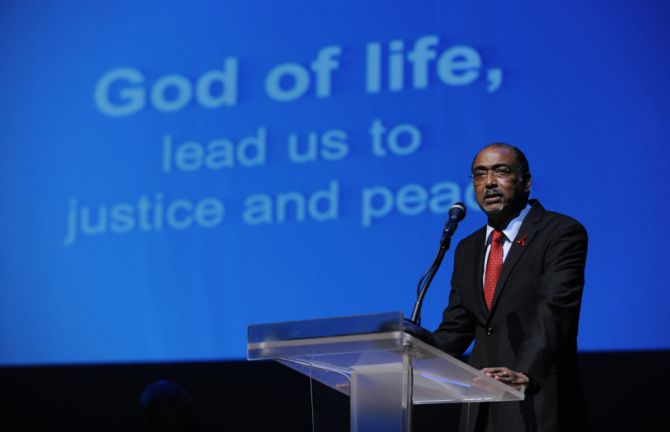

UNAIDS Executive Director Michel Sidibé addressing the 10th Assembly of the World Council of Churches. Busan, Republic of Korea, 30 October 2013. Credit: Peter Williams/WCC

L to R: Anglican Archbishop Bernard Ntahoturi of Burundi; Archbishop of Canterbury Justin Welby; Mr Michel Sidibé, UNAIDS Executive Director; the Most Rev. Thabo Cecil Makgoba, Anglican Church of Southern Africa. Busan, Republic of Korea, 31 October 2013. Credit: Peter Williams/WCC

UNAIDS Executive Director Michel Sidibé (center) and people working on HIV through churches all over the world, some of whom are openly HIV-positive, pose for a group photo. Busan, Republic of Korea, 30 October 2013. Credit: UNAIDS
Feature Story
UNAIDS Executive Director addresses Christian communities at 10th Assembly in Korea
01 November 2013
01 November 2013 01 November 2013The World Council of Churches (WCC), a fellowship of Christian Churches, opened its 10th Assembly in the South Korean city of Busan on Wednesday 30 October. Some 3000 delegates from more than 100 countries gathered to focus on the theme ‘God of life: lead us to justice and peace.’
UNAIDS Executive Director Michel Sidibé was invited to participate in the conference and began his visit with a lively meeting with people living with HIV and people working on HIV through church communities across the world. He also met with the Anglican Archbishops of Canterbury, South Africa and Burundi where they discussed the role of the Church in the HIV response and the importance of speaking out to break the silence around sexual violence and HIV as well as the importance of access to affordable medicines.
Mr Sidibé was asked by the Assembly organisers to give a talk which would set the tone for the WCC Assembly’s discussions on ‘Justice and Peace’ and give direction for the WCC’s future action. Recognizing the critical role of churches in health care world-wide he the challenged delegates to push the boundaries on sensitive issues such as sexuality, to speak out against injustice, to push forward the drive to provide medicines for everyone in need and to rise to the challenge of bringing the most marginalized to the table where policy is set and decisions are made.
Mr Sidibé was joined in the thematic plenary session by the Anglican Bishop of Colombo, Dr Tawfik, a Theologian from the Coptic Orthodox Church of Alexandria and MÉlisande Schifter, a young theologian from Germany who challenged participants to focus their rich experience into suggestions for action to young people present at the Assembly.
Quotes
Social justice is close to your hearts — join us to make a call that no one should be left behind when it comes to treatment… We must not take our foot off the pedal now. We must redouble our efforts, I will refuse silence when what we look for is justice. If we don’t pay now as a global community to finish the task we have started, then we will pay forever — both financially and in human lives.
I was really struck by the challenge of providing access to medicines for people living with HIV and the push for global solidarity on that issue. This is something we too can throw our weight behind.
In the context of discussions around HIV and sexuality in the Church one of the very important groups is INERELA+ the International Network of Religious Leaders Living with and personally affected by HIV. This is a group of religious leaders some of whom have openly declared their HIV positive status. They have been a great help to many people in the Church who are living with HIV.
We will not get to zero without liberating sexuality as a faith community.



